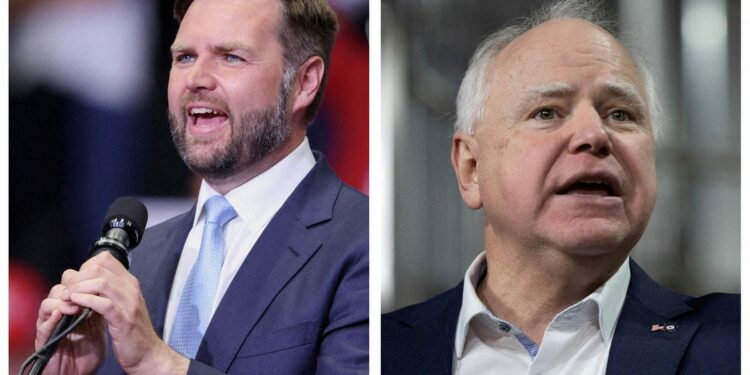Tim Walz and JD Vance confirm vice presidential debate in October
Vice presidential candidates JD Vance and Tim Walz will participate in a debate hosted by CBS News scheduled for October 1st.
The contrast between the two presidential candidates is perhaps nowhere as stark as in their different approaches to schooling America’s children.
And that distinction is perhaps most embodied by their clashing running mates: One is a liberal former high school teacher and coach who struggled to have children and now has a son with special needs and a daughter with his longtime educator wife. The other is a former venture capitalist who overcame a difficult childhood of his own, met his wife when they were both at Yale Law School and now has three children.
President Donald Trump and Vice President Kamala Harris have fundamentally different interpretations of the purpose and function of the American education system. Their visions are largely aligned with how their parties’ value hands-on and hands-off policies.
Trump’s running mate, JD Vance, wants to mostly erase federal involvement in education policy and bolster the rights of states and parents, while Harris’ running mate, Minnesota Gov. Tim Walz, has long pushed to shore up support for public education and teachers unions.
“If you look at the histories and thought forms of Vance and Walz, theyтАЩre kind of talking about different things,” said Thomas Howell, the founder of a tutoring company that serves New York City families. “VanceтАЩs position has a lot to do with ideology and whatтАЩs taught at schools, and WalzтАЩs position is on logistics and public education.”
Access to quality public schools
School choice was a staple of Trump’s 2016 presidential campaign. At the time, he promised to fund the expansion of access to alternative schooling options to give kids an avenue out of public schools. Vance, his running mate, has echoed Trump’s support for the school choice movement.
For Diana Reyes, a mom of two in Las Vegas, Nevada, the issue will define how she votes in the upcoming presidential election. After seeing her daughter fall behind in public school years ago, she took on thousands of dollars in credit card debt to enroll her in tutoring programs.
When her younger son, Daniel, started experiencing the same issues, Reyes sought a scholarship to help enroll him in private school. Vouchers ultimately helped him stay there, she said, and he’s now on track to be the first in their family to graduate college in December.
“I see the difference that it made for my son,” she said, “and how it turned his life around.”
People and teachers unions who oppose school vouchers, including Harris and Walz, argue that state funding should be used to pay for and improve public schools. Their arguments are largely rooted in the idea that every student should have access to a quality public education, and that state and federal dollars shouldn’t fund alternatives at public schools’ expense.
Recent research offers limited evidence that school vouchers actually help traditionally disadvantaged kids thrive. As governor of Minnesota, Walz also opposed a state Senate-led effort for education savings accounts, which grant parents public funds to pay for nonpublic schools.
Trump’s Agenda47 on education Abolish teacher tenure, universal school choice, patriotism
For North Carolina mother Renee Sekel, Walz’s record displays “a dream of what a candidate should be on public education.” Her three teenagers, one of whom is nonbinary, attend or went to public school. She wants to vote for a candidate who’s willing to invest in education that’s available to everyone, including her own children.
“The push toward school vouchers by definition is instructionally meant to destroy public schools,” she said. “When you pull kids out of public schools, the costs to run those public schools don’t necessarily decrease, and kids who are there lose access to valuable programs.”
Guns in their classrooms
There were at least 144 incidents of gunfire at K-12 schools last school year тАУ a 30% increase over the year before, according to an analysis from David Riedman, who oversees a school shooting database, and the gun violence prevention group Everytown for Gun Safety.
Rebekah Schuler, 18, was attending Oxford High School in Michigan three years ago when four students were killed and six others were wounded. She heard the gunfire. As a young voter, Schuler said she will only vote for “gun sense” candidates who have the political will to pass laws that protect students from firearms.
“School safety is the most important thing on the ballot this year,” Schuler said. “Young voters are doing everything we can to make schools safe.”
Both Walz and Vance are supporters of the Second Amendment, which grants Americans the right to bear arms. While Walz has said he supports a complete ban on assault weapons, Vance has said he opposed the Bipartisan Safer Communities Act, a federal law that expanded background checks for obtaining firearms.
Vance has also called red-flag laws тАУ which gun-violence prevention advocates argue help decrease school shootings тАУ “a slippery slope … that don’t solve the problem of gun violence.”
Culture wars in the classroom
In Minnesota, Walz signed a state bill this year prohibiting schools and libraries from banning books. Many of the bans had been aimed at books tackling racial, social justice or LGBTQ+ issues.
Walz’s support for LGBTQ+ rights dates all the way back to the 1990s, when he helped start Mankato West High SchoolтАЩs first Gay-Straight Alliance. Then a high school educator, Walz went out of his way to create a safe space for queer students, theyтАЩve said publicly, at a time when classrooms were less inclusive compared to today.┬а
Vance has equated teaching children about gender identity and sexual orientation with тАЬgroomingтАЭ during a 2022 Fox News interview when he was running for Senate. He introduced a congressional bill last year that would have banned gender-affirming care for minors nationwide (the legislation hasnтАЩt progressed in Congress).┬а
He has voiced opposition to increasing diverse viewpoints in the classroom, accusing teachers of radicalizing children for teaching about LGBTQ+ identities and civil rights at premature ages.
BidenтАЩs new Title IX rules Are all set to take effect. But not in these states.
Moms for Liberty, a conservative parent group, has adamantly backed the Trump-Vance ticket.┬а
тАЬWe are excited to see a candidate for Vice President who is a devoted husband and father,” group co-founders Tina Descovich and Tiffany Justice said in a statement to USA TODAY. “We look forward to the possibility of an administration that will stand up for kids in our public education system, and who are willing to call out public schools for focusing more on indoctrinating children than teaching them the basic skills of reading and mathematics. тАж We are always fighting to ensure that parental-rights minded candidates are in office at all levels of government, and we are hopeful that JD Vance, as a father, can embody these principles.тАЭ
Heightened focus on universal access to school meals, menstrual products
As the coronavirus spread in 2020, the Trump administration made free school meals available to every American student and extended those waivers through the following school year. But when the pandemic-era federal policy ended in 2022, parents like Amber Lightfeather felt deserted. Financial struggles left Lightfeather, a research specialist and mom of five, and her family homeless for about six weeks in 2022.┬а
тАЬMy boys would be like, тАШMom, I didnтАЩt eat today,тАЩтАЭ she said. тАЬIтАЩd say, тАШNo, you eat. IтАЩll figure out a way to pay for it.тАЩтАЭ┬а
Lightfeather lives in Duluth, Minnesota, where a bill was signed into law by Walz as governor last year, guaranteeing free school meals across the state. That law made a big difference in Lightfeather’s life, freeing up other parts of her familyтАЩs budget to pay for things like clothes.┬а
Last year, Walz also signed a law in Minnesota┬аgranting students free menstrual products.
Vance hasn’t explicitly said what he thinks about making free meals or period products available to students, but the Republican Party platform is generally opposed to increasing federal government spending.
In response to an email from USA Today inquiring about Vance’s stance on free meals and menstrual products, Trump Campaign National Press Secretary’s Karoline Leavitt did not directly answer the question, but wrote: “Tampon Tim put tampons in boys’ bathrooms, wants men to play in womenтАЩs sports, and supports gender transitions for minors.”
It’s not the first time: GOP leaders are calling for religion in public schools.
The candidates’ VP picks only solidify how different their visions are for U.S. schools, including their views on empowering тАУ or weakening тАУ the public school system, said Jonathan Collins, an assistant professor of political science and education at Columbia University’s Teacher College.
“One candidate is looking to expand public education, and one is looking to shrink it,” Collins said. “One is looking to education as something as cultural progress and integration, while the other is looking at education as a source of cultural conflict.”
Contact Kayla Jimenez at [email protected].┬аFollow her on X at @kaylajjimenez.
Source link : http://www.bing.com/news/apiclick.aspx?ref=FexRss&aid=&tid=66c1267bba144ae286d5f8174128a4ef&url=https%3A%2F%2Fwww.azcentral.com%2Fstory%2Fnews%2Fnation%2F2024%2F08%2F17%2Fwalz-vance-future-kids%2F74705079007%2F&c=16067569838624180839&mkt=en-us
Author :
Publish date : 2024-08-16 15:03:00
Copyright for syndicated content belongs to the linked Source.












